- Home
- Gerald Hammond
Bloodlines (Three Oaks Book 8)
Bloodlines (Three Oaks Book 8) Read online
BLOODLINES
Gerald Hammond
© Gerald Hammond 1996
Gerald Hammond has asserted his rights under the Copyright, Design and Patents Act, 1988, to be identified as the author of this work.
First published in 1996 by Chivers Press.
This edition published in 2019 by Endeavour Media Ltd.
Table of Contents
Chapter One
Chapter Two
Chapter Three
Chapter Four
Chapter Five
Chapter Six
Chapter Seven
Chapter Eight
Chapter Nine
Chapter Ten
Chapter Eleven
Chapter Twelve
AUTHOR’S NOTE
Chapter One
It was the finest autumn that I could remember, that year when Sam was four. For once, the first frosts delayed until the equinoctial gales were past. Then the frosts came and the wind fell away so that the leaves hung on the trees, yellow and gold and orange and bronze and flaming scarlet, seeming to get brighter as the days went by and the sun still shone down, cooler but bright, on the Kingdom of Fife and other, less significant, parts of Britain. And people were telling each other that it would be a short winter for a change.
One of the first shoots of the season, on a morning that somehow managed to be both crisp and temperate, was Lord Crail’s. I was invited to attend for once as a guest Gun rather than in the capacity of the picker-up—a humbler capacity but equally enjoyable, if not more so. Crail’s account with the kennels had grown to mammoth proportions and although I had not been hurrying him—for he always paid up in the end—he had felt guilty enough to include me with the friends and sundry other creditors who were his guests. Thus he made sure of my goodwill while at the same time gaining the unpaid services of Beth and myself anyway to help with the picking-up—that is to say, the seeking out after each drive any birds hit but not gathered by hand, with the help of a selection of our dogs. The money saved on pickers-up would have gone to pay those in the beating line who were not Crail’s friends or relations or beholden to him for something. Freddy Crail’s life was, a long process of robbing Peter to pay Paul but somehow he always seemed to scramble through. He even managed to get from it a certain excitement appropriate to success at any game of skill.
Crail’s shoot was not at his family home, where the land was mostly pasture and too flat to be suitable for showing good birds. Instead, he had managed to put together the sporting rights to three arable farms, twenty miles from his home but only five from ours.
As we turned in to a tarmac farm-road I was saddened to see two ladies, one of them young but the other definitely not, flaunting placards which bore the legend ‘Ban this cruel sport’. Living as we do where shooting is part of the way of life, we had been largely free from the objectors who, further south, were rushing to destroy the old and valuable out of an ill-founded sense of righteousness.
In the cobbled farmyard between the old stone buildings which stood at the core of the shoot, Beth and Blossom and Horace and Jason and I were having a chat beside the car while we waited for the customary pre-shoot briefing (no low or immature birds, no ground game except foxes and feral cats and a stiff fine for a white pheasant in the bag). Beth is my wife. Jason was her personal Labrador and the others were springer spaniels. I was feeling good. The sun warmed my back and even the aftermath of my long illness was forgotten.
The first hint that the day might not be as halcyon as I was expecting came when Beth looked over my shoulder and said, ‘Oh-oh! Here comes your bête noire.’
I knew who she meant, but I looked round anyway. Ben Garnet, lean and hawk-faced, was climbing out of a large estate car and looking, as usual, totally self-satisfied. I thought that I never seemed to see him in the same car twice. Either he dealt in them on the side or he took them as bad debts.
‘Bugger it!’ I said. I do not usually swear in front of Beth, if only because she looks far younger than her real age and much too young to be exposed to bad language. But Garnet’s presence had driven the sunshine away.
In calling him my ‘bête noire’, Beth had understated my true feelings. Perhaps it is because I am a compulsively honest person. In my simplistic way I yearn for a world in which doors can be left unlocked and people can trust one another; the thought of a world peopled by politicians and other crooks comes close to my vision of hell. What, I wondered, makes such people so special that they feel a right to help themselves at the expense of the rest of society? My choice of career might easily have been the police except for the greater revulsion that dishonesty on an international scale triggered in me. Instead, I had opted for the army and had played my small part in the UN’s policing role whenever dishonesty on a grander scale triggered riots or genocide.
In the real world between the two extremes I had envisaged, I can understand if not approve the thief who needs something, wants it and takes it. But Ben Garnet was a shark of a different breed and quite beyond my comprehension. He was not badly off so far as I could tell—although another man’s financial status is not always easy to judge. A yacht or a Rolls may be a sign that he has money . . . or that he had money before he bought the yacht or the Rolls. Ben Garnet entertained lavishly in his converted farmhouse about four miles from Three Oaks Kennels. I had never been invited and never would be—his guests were usually councillors or businessmen who could be useful to him. There were rumours about girls and soft drugs at some of the parties from which his wife was usually absent—whether for reasons of tact or ignorance was never established. Status symbols were important to him. He had horses in a paddock although nobody had ever seen him ride.
News of his activities went the rounds as regularly as the dustcart, and these were never above board. When he bought into a firm it collapsed within the year, his partners were bankrupt but somehow Garnet was left to sell off the assets at a profit to himself. I knew for a fact that he had persuaded the heirs to sell him his present house at a bargain price before the previous owner was quite dead and that he still owed several of the workmen for the cost of the modernization.
But I had a more immediate and personal reason for my detestation of the man.
A kennels that depends for much of its income on training gun dogs—of its own breeding or those of outside clients—needs access to land holding game. One may get through the intermediate stages of training using pigeon and rabbits (which are not game and which the farmer has the right to control) or by using clever gadgets that simulate the flushing of a bird or the bolting of a rabbit. But before a dog has a real chance in field trials—the arena in which reputations are made or lost and values are established—real experience is needed on real game, more than can be given during those occasional days at picking-up which can be squeezed in between the inevitably conflicting trials dates.
Several years earlier we had acquired the sporting rights to Foleyknowe Estate, in partnership with a small game dealer and part-time keeper, and we had worked the shooting up to a standard which was modestly profitable on a commercial basis and a perfect training ground for the spaniels. Our successes in field trials had come more regularly and our prices, including those for stud service, had risen accordingly.
That spring, however, the owner had been abroad and, despite reassuring phone calls, our sporting lease had not been formally renewed. Then, during the summer, Mrs de Forgan, the owner, had been killed in a car smash in Spain.
It had seemed only respectful to wait patiently for the executor and trustee to come back to us. But in the meantime, Ben Garnet had got wind of the situation. He approached the executor direct and made an offer for the sporting rights.
The executor told me later that Garnet had assured him that he was acting with our agreement, though Garnet denied it when I challenged him. But the damage was done, a new lease had been signed and we lost the use of Foleyknowe, the work we had done and all the birds which had already been released for the coming season.
Within days, Garnet had signed the sporting rights over to another of my bêtes noires, a commercial operator who I knew would show easy birds to visiting Guns at exorbitant prices and without paying even token respect to the habitat we had patiently nurtured. An ecological asset-stripper, in fact.
So I had good reason to dislike Ben Garnet. What particularly stuck in my craw was that for the sake of a modest profit to himself he had done us damage of ten times greater value. Yet, when we met, he acted as though he had done us a favour.
‘If I’d known he was coming . . .’ I began.
‘You’d have baked a cake?’ Beth suggested.
I spurned her attempt to lighten the atmosphere. ‘I’d have baked him in a slow oven,’ I said, ‘or stayed a long, long way away.’
She nodded. ‘I wonder what happened to him in his childhood,’ she said.
‘Nothing fatal, I’m sorry to say.’
‘I didn’t mean that.’ Beth’s smooth brow creased with the effort of expressing her analysis of Ben Garnet. ‘He must have grown up feeling terribly insecure if he believes that his manhood would be threatened if he gave somebody a fair deal.’
‘Is that really how you see him?’ I asked.
‘He seems to feel a compulsion to cheat even if he’s the loser in the long run.’
‘That much I know,’ I said. ‘It was the manhood bit that made me sit up.’
Beth ignored my disgression. ‘The local tradesmen won’t work for him any more,’ she said. ‘Sometimes they take him to court, looking to be paid, but they rarely win.’
‘I believe he’s a lawyer,’ I said. ‘But maybe only of the barrack room variety. Nobody seems to be sure about his true background, but he always has the angles covered.’
‘Well, he doesn’t do himself any good. He’s having to bring plumbers over from Dundee when his heating goes wonky. It must cost him a bomb.’
We had no more time for idle chat. Lord Crail button-holed me for some more free advice about his dogs. The beaters went off in a trailer, their numbers swelled by some of Crail’s younger relatives. Crail’s head keeper, a former warrant officer in the Scots Guards who bullied Crail mercilessly and always seemed to draw his salary even when his employer’s finances were at their lowest ebb, coughed once. The voice which had once been able to set a regiment in motion was reduced to a comparative whisper by the passage of the years, but he gave a commanding jerk of his head and the proceedings began.
In a way, I thought, Garnet and Crail were a pair, but Lord Crail was open and apologetic and somehow always cleared his debts in the end whereas Garnet possessed the nerve of the devil. While the usual introductions were being performed I gave him the remotest nod which would be consistent with politeness to my host but Garnet beamed and nodded as though I had kissed his feet. He knew that I despised him, but to him that knowledge was as water off a duck’s back. I was never sure whether he deluded himself that the world was blind to his ways or whether he pretended, as part of a calculated front, to be unaware of the general resentment. The Fifer, like any other Scot, shies away from debt and expects another man’s word to be his financial bond.
I drew number 2. To my relief, Garnet drew 6, which would keep him about as far from me as was possible for most of the day. He was a safe enough shot, but on one previous occasion when he and I had drawn adjoining pegs I had found him to be a greedy one, taking birds at long range which would otherwise have passed over my head.
The Guns had only a hundred yards to walk to where we were placed at pegs along a muddy track. The first drive was from a field of turnips. It would have been usual for a non-shooting wife to stand with her husband but Beth knew Lord Crail’s second motive for the invitation perfectly well. In this way he gained the services of Beth and several of our dogs without payment of the customary token fee. She trotted away with Jason to the other end of the line and the ex-RSM hobbled off stiffly to take up a position behind the middle ground with his two Labradors sitting to attention beside him.
The beaters could be heard coming through a sparse wood that sprawled over the shoulder of a low hill. They emerged into the turnips. I felt the usual surge of anxiety-induced adrenalin. When shooting in company, the sound of each shot draws attention and every miss is conspicuous. A change in one’s own reactions, a different batch of cartridges, a loss of confidence, any of these could induce a sequence of misses exposing the victim to derision. My shooting for months past had been of rabbits and the humble bunny is tied to two dimensions with only minor variations. A rabbit is to a curling pheasant as Karting is to Formula One.
One end of the beating line was still on the hillside and a Labrador put a cock pheasant out of a patch of golden bracken. Clocking angrily and climbing, the bird headed in my direction. Its colours blazed in the winter sunshine. All eyes were following it. My mouth was dry. At the last moment I mounted the Dickson ahead of the bird and squeezed the trigger as it came to my shoulder. The bird turned over in the air, stone dead, took several seconds to fall a hundred feet before hitting the ground with a thump.
Suddenly I was at ease.
The first frosts had killed off the insects in the turnips so that few birds came out of that field; and not all of those that got up were willing to climb like that first cock. Even so, a scattering of good birds were greeted by a satisfactory crackle of shots. By the time the beaters arrived and the whistle went for the end of the drive, there were several birds to be picked at my end of the line including a difficult runner in the set-aside behind us and a duo which had flown on into the middle distance before collapsing. The set-aside would be the next drive and was better left—the beaters would pick the runner on the way through. The others had made it to an area of gorse a hundred yards behind the pegs.
The two spaniels were working through the gorse when Lord Crail joined me, a well-grown hen pheasant dangling from his hand. (The birds were mostly hens. Crail had purchased ex-laying birds from a game farm, which was how he had come to have mature birds on the ground so early in the season.) His yellow Labrador had been handling well, I had noticed with pleasure. I had trained the dog for him myself and repaired the damage whenever Crail untrained him on the rabbits each summer. Crail was as sturdily built as his Labrador and with much the same colour of sandy hair.
‘We’re a bit short-handed on the picking-up side,’ he said apologetically.
‘We don’t mind helping out,’ I said. I looked on the help and the white lie as a discount for a favoured customer. We might sometimes have to wait for our money but Crail made up for it by singing our praises.
‘That’s good,’ he said. ‘My aunt will be along but she can’t make it until after lunch.’
(I nodded. Lord Crail’s elderly aunt and her golden retriever were a formidable team.)
‘I see that Garnet isn’t working his bitch today,’ I remarked. The one thing that could be said for Ben Garnet was that when it came to dogs he knew what he wanted and made sure that he got it. From one of my clients he had obtained a bitch, daughter of one of my breeding and already close to field-trial standard, and as far as I could discover he had actually coughed up the substantial purchase price. Unlike most such purchasers he had kept her up to the mark, working her in the field and even competing on occasions with modest success, although, true to type, he was not above a little bending of the rules.
‘I saw Cleo in his car,’ Crail said, ‘but he tells me that she’s in season. He says that he only brought her along because there’s nobody at home to look after her. I only hope that her presence doesn’t put the other dogs off their work. Shall I send Bosco in to help?’
‘Not yet,’ I said quickly. The last thing I wanted would be
two dogs competing for the same bird.
‘Garnet’s backing a deal that involves a piece of my land,’ Crail said. It was very close to another apology.
I wanted to tell him to hold a long spoon but decided that Crail should know his company. ‘I understand,’ I said.
‘You can’t stand the man.’
‘That’s hardly your fault.’
‘True.’ Crail paused. ‘All right, so he’s not perfect. But he quite likes you. He asked whether you’d be here and seemed pleased when I said that you would.’
Blossom emerged from the cover, a hen pheasant in her mouth still kicking. I took it from her and did the necessary while she grinned at me, obviously very pleased with herself. Her tail swished in the dried grass. I made her stay. I could hear Horace still working in the gorse. Blossom was frantic to go and join the fun but she had to learn that she was there to do my will, not her own.
There was a sudden stir in the gorse and a grunt. Moments later, Horace came out with the other hen pheasant, stone dead.
‘That’s the lot?’ Crail asked. I said that it was. ‘Let’s get on,’ he said. We walked back to where the other Guns were chatting. A flask was doing the rounds. The beaters had already gone on and as soon as we appeared the ex-RSM began to chivvy the guns towards the two Land Rovers which were standing by.
Sport picked up towards lunchtime. A cunning host will save his better drives for later in the day. A canny keeper may then send them over too high and fast for the average Gun. The fourth drive was spectacular, with birds in plenty crossing a valley and slanting downward towards home. Crail, I decided, must have been in funds around the previous June.
As shoot lunches go, that day’s came somewhere near the middle of the spectrum—neither a soggy sandwich in a steamed-up car nor a sit-down guzzle in the Great House but a civilized buffet with a modest wine, served from trestle tables in a barn. There were straw bales to sit on while eating chicken legs and sausage rolls and pâté on crusty bread and juggling with salad. By then we had worked back to near where we had started. The beaters had gathered in the head keeper’s cottage nearby, probably enjoying greater comfort but a less elevated menu.

 Home to Roost
Home to Roost A Dead Question
A Dead Question Twice Bitten
Twice Bitten The Curse of the Cockers
The Curse of the Cockers In Loving Memory
In Loving Memory Illegal Tender (Three Oaks Book 12)
Illegal Tender (Three Oaks Book 12) Cold Relations (Honey Laird Book 1)
Cold Relations (Honey Laird Book 1) A Brace of Skeet
A Brace of Skeet Silver City Scandal
Silver City Scandal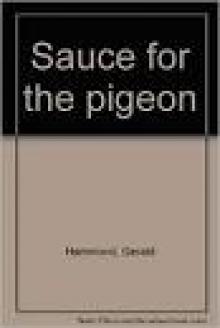 Sauce For the Pigeon
Sauce For the Pigeon Cold Relations
Cold Relations Hook or Crook
Hook or Crook The Curse of the Cockers (Three Oaks Book 5)
The Curse of the Cockers (Three Oaks Book 5)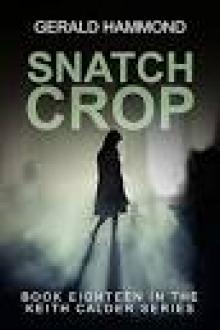 Snatch Crop
Snatch Crop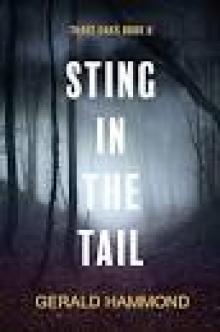 Sting in the Tail (Three Oaks Book 6)
Sting in the Tail (Three Oaks Book 6) A Dead Question (Honey Laird Book 2)
A Dead Question (Honey Laird Book 2) In Loving Memory (Honey Laird Book 3)
In Loving Memory (Honey Laird Book 3) Thin Air
Thin Air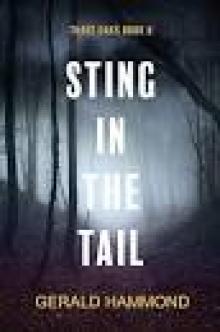 Sting in the Tail
Sting in the Tail Pursuit of Arms
Pursuit of Arms The Game
The Game Give a Dog a Name (Three Oaks Book 4)
Give a Dog a Name (Three Oaks Book 4) Fair Game
Fair Game The Executor (Keith Calder Book 10)
The Executor (Keith Calder Book 10) Whose Dog Are You? (Three Oaks Book 2)
Whose Dog Are You? (Three Oaks Book 2)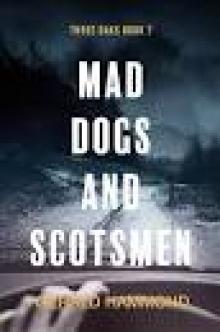 Mad Dogs and Scotsmen (Three Oaks Book 7)
Mad Dogs and Scotsmen (Three Oaks Book 7) Cousin Once Removed
Cousin Once Removed The Worried Widow
The Worried Widow A Shocking Affair
A Shocking Affair Dead Weight (Three Oaks Book 11)
Dead Weight (Three Oaks Book 11) Whose Dog Are You
Whose Dog Are You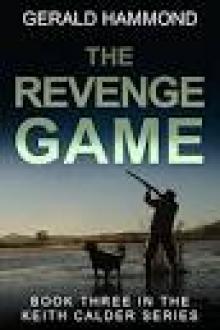 The Revenge Game
The Revenge Game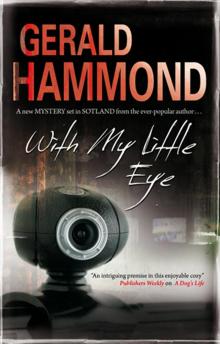 With My Little Eye
With My Little Eye Doghouse (Three Oaks Book 3)
Doghouse (Three Oaks Book 3) In Camera
In Camera Bloodlines (Three Oaks Book 8)
Bloodlines (Three Oaks Book 8)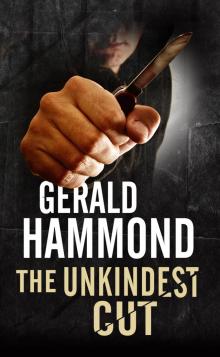 The Unkindest Cut
The Unkindest Cut